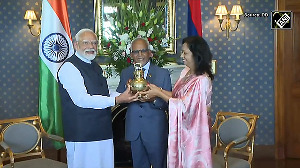Notwithstanding the recent hardening of interest rates and the impending slowdown in the US, India Inc expects to better its performance in 2007, a poll of 50 top chief executives carried out by Business Standard has revealed.
With the economy growing at 9.1 per cent in the first half of 2006-07, all the CEOs said the momentum would continue in 2007 and demand would remain buoyant. Each of them expected his company's turnover, as well as profits, to grow faster in 2007 than in 2006.
"The economy finds itself in the midst of a capex cycle and this should continue well into the next year," said Federation of Indian Chambers of Commerce & Industry President Saroj Poddar.
"The outlook is positive. We can hope for better times in the coming year," said Asian Paints vice-chairman & managing irector Ashwin Dani.
"Profitability in the manufacturing sector is expected to rise almost 17-18 per cent vis-a-vis last year," added JSW Steel vice-chairman and managing director Sajjan Jindal.
The CEOs polled represented all the important sectors of the economy, including energy, automobile, information technology, engineering, aviation, pharmaceuticals, paper, textile, steel, cement, advertising and travel & tourism.
While they felt that there could be a further hardening of interest rates due to a rise in inflation, most of them said it would not impact their business in any significant way as their dependence on domestic debt had come down over the years.
"Our business plans will not be affected if interest rates harden. Bajaj Auto is a debt-free and cash-surplus company," said Bajaj Auto chairman Rahul Bajaj. Added Tata Steel managing director B Muthuraman, "For funding decisions, there are alternatives to the domestic debt market."
However, some CEOs said a rise in interest rates could impact customer behaviour. "A marginal impact may be noticed, with some segments going in for loans of a longer tenure," said General Motors (India) CEO Rajeev Chaba.
Most CEOs did not expect any significant impact of the slowdown looming over the US economy. Though the country continues to be India's largest trading partner, companies have hedged themselves by raising their exports to countries in West Asia, Europe and the Far East.
Several of these markets, like Japan and Germany, are projected to grow at a fast clip in 2007. Some respondents even hoped that with the US economy cooling off, crude oil prices would not shoot up during the year.
Some CEOs expected US companies to undertake cost arbitrage by offshoring more work on account of the slowdown.
"It would be an opportunity for us since we are the outsourcing partners of choice for many large life sciences companies in the US. The slowdown would force US companies to be more competitive and, therefore, increase their outsourcing to reduce costs," said Jubilant Organosys chairman & managing mirector Shyam Bhartia.
However, some like Godrej chairman Adi Godrej and Marico chairman & managing director Harsh Mariwala feared that a shortage of skilled manpower and rising real estate prices could hamper growth in the year to come.
"Industry is currently facing a serious shortage of trained manpower of the kind it needs," said Bharat Forge chairman Baba Kalyani.
On the political side, most respondents said they expected the Manmohan Singh government to bring about more liberalisation in key sectors like telecom, retail, pension and insurance in 2007, despite the tough stance taken by its Left allies.
"The factors against reforms would be a combination of security concerns (as in telecom) and resistance from coalition partners (as in pension, retail and insurance)," cautioned Larsen & Toubro chairman & managing director AM Naik.






 © 2025
© 2025